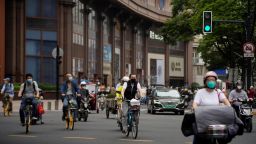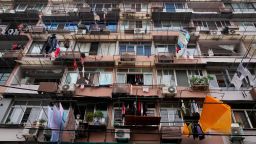Shanghai will carry out Covid-19 testing on more than half of its 25 million residents this weekend, fueling fears of a return to more stringent restrictions just days after the financial hub emerged from two months of painful lockdown.
The mass testing announcements sparked fears of a return to stringent, prolonged lockdown among Shanghai residents, many of whom had been confined to their homes for two months or more since March.
Those fears have triggered panic buying. On Thursday, Shanghai residents rushed to supermarkets to stock up on food and other daily necessities, forming long lines at checkouts and leaving shelves empty, according to photos and videos that circulated on social media.
At least seven of the city’s 16 districts, with a combined population of 15 million people, will roll out mass testing over the weekend, Zhao Dandan, deputy head of the Shanghai Municipal Health Commission, said at a news conference Thursday. The districts include Shanghai’s most populated areas and busy business hubs, such as Pudong and Xuhui.
Districts that have reported positive cases since Shanghai lifted its citywide lockdown on June 1 will be placed under “closed management” during the collection of test samples, Zhao said. She did not specify how long the sampling period will last.
In China’s zero-Covid policy lexicon, “closed management” usually refers to restrictions that bar people from leaving their residential communities or workplaces.
But the mass testing campaign extends far beyond the seven districts named by the Shanghai health authorities.
On Thursday evening, Changning district, home to the Shanghai Hongqiao International Airport and 700,000 residents, announced on its official social media account that it will carry out mass Covid testing on Saturday.
“During the sampling period, closed management will be enforced on residential communities, where (residents) can only enter but not leave,” the statement said.
Earlier on Thursday, Songjiang district also said on social media that its 1.9 million residents are all required to undergo Covid testing over the weekend.

Abrupt U-turn
Chinese leaders have repeatedly vowed to stick to the zero-Covid policy, which aims to swiftly stamp out local outbreaks with mass testing, snap lockdowns, extensive contact tracing and quarantining.
Officials warn that a relaxation of the policy will lead to a surge in hospitalizations and deaths among the country’s elderly population – many of whom have yet to be fully vaccinated.
But the strategy is facing increasing challenge from the highly transmissible Omicron variant, and causing mounting discontent among residents whose life have been frequently disrupted.
In China, detection of a single positive case can send an entire building or community into government quarantine, and place several nearby neighborhoods into lockdown for two weeks.
Since the easing of restrictions on June 1, Shanghai has continued to report Covid cases, including among residents outside quarantined areas. As a result, an increasing number of neighborhoods have been placed back under stringent lockdown.
A video obtained by CNN shows high fences erected to cordon off a large section of the tree-lined former French Concession area in downtown Shanghai.
On Thursday, Shanghai authorities reported six new local Covid cases, three of which were traced to a downtown hair salon. State media had earlier reported that three employees at the salon tested positive, likely resulting in the quarantine of 13 other workers and 502 customers – and their close contacts – who visited the salon in the past week.
One Shanghai resident told CNN that more than 200 people living in two buildings in their neighborhood have been placed under lockdown, after two residents there were identified as close contacts of the hair salon cases.
Meanwhile in Beijing, the city’s largest district announced Thursday the closure of all entertainment venues, including bars, internet cafes and some sports facilities, just days after allowing them to reopen.
The abrupt U-turn came after authorities reported three local Covid cases, all linked to a bar in Chaoyang district, home to the capital’s main nightlife scenes. Several other districts in Beijing have since announced similar closures.







